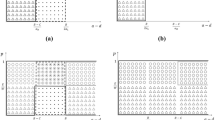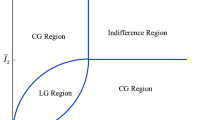Abstract.
We consider a set-up where two governments have either conflicting or matching preferences on the provision of differentiated (local) goods supplied by a common monopoly bureau. We develop a two-stage game. At stage-1, the two governments decide whether or not to merge into a single institution. At stage-2, all players simultaneously and independently take their decisions in terms of production and rents, with perfect knowledge of the other players' strategies. We solve the subgame perfect Nash equilibrium of this game, and show that, if the bureau immediately updates its objective function to institutional changes, then the governments always prefer merging. However, if there is an initial bureaucratic inertia in adjusting the bureau's objective function to the institutional change, then ruling politicians may prefer decentralisation to centralisation, depending on the strategic properties of the compliance game and on their own discounting.
Similar content being viewed by others
Author information
Authors and Affiliations
Additional information
Received: May 1999 / Accepted April 2000
Rights and permissions
About this article
Cite this article
Fedeli, S., Santoni, M. Endogenous institutions in bureaucratic compliance games. Econ Gov 2, 203–229 (2001). https://doi.org/10.1007/PL00011025
Issue Date:
DOI: https://doi.org/10.1007/PL00011025




